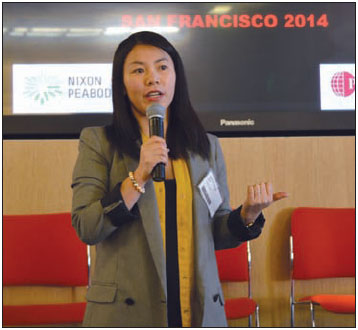WeChat to take on WhatsApp
China's WeChat, the fastest growing mobile social app in the industry, is setting its sights on the US market and says it's committed to offering unique value to brands, charities and education as part of its 2014 market strategy to challenge WhatsApp, the Silicon Valley-based startup that Facebook bought for $19 billion last month.
WeChat "can be used as a platform to promote themselves, manage customer service and even connect online businesses", said Victoria Wu, director of international business for Tencent's WeChat, during a Thursday event hosted by the Silicon Dragon in San Francisco. Wu is in charge of WeChat's partnership development in the US.
Led by media entrepreneurRebecca Fannin, Silicon Dragon Venture provides news and analysis of trends shaping startups, venture capital and innovations in the world'semerging markets.
Fannin met with Wu at Stanford on Wednesday where she was talking with some professors who are considering using WeChat as a platform to improve student participation.
"What usually takes 20 minutes, is only one minute on WeChat. Using WeChat also facilitates classroom interaction between professor and student," Wu said.
In a recent case, Wu had persuaded Vivienne Tam, a fashion designer, to use WeChat during her fashion show in New York. Every participant downloaded WeChat to communicate with each other and Tam was also able to interact with her business clients on the platform.
"How serious is Tencent on its global expansion?" Wu said. "We are committed. Tencent is very serious about serving our users around the world." Wu added that the service would be "stable" and "reliable".
She said WeChat is more "product" and "user experience" focused, which makes it more competitive among mobile social apps.
Being more versatile than WhatsApp, WeChat allows users to send text, photos, voice messages and find each other by using their smartphones, as well as book and pay for taxis, and track friend's locations.
"At the beginning of globalization, the mobile app is seeing a very high growth in the user base. Therefore, how to make a quick response to users' changing needs is WeChat's biggest challenge," Wu said.
Jennifer Hodges, a communications officer of Tencent in the US, told China Daily the team is working on educating their US users to take advantage of the "scan the QR code" of WeChat, which is much more widely accepted by Chinese users.
According to a report of AFP, Hong Kong-listed Tencent's shares saw an increase of 9.4 percent after the WhatsApp deal was announced.
The market capitalization of Tencent has been as high as $150 billion, which approaches Facebook's monumental $180 billion, said the report.
|
Victoria Wu, director of international business for WeChat in the US, talks at an event hosted by the Silicon Dragon in San Francisco on March 13. Chen Jia / China Daily |

























